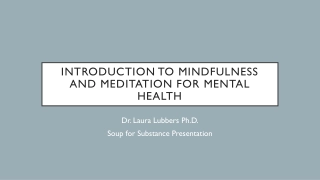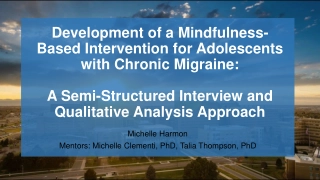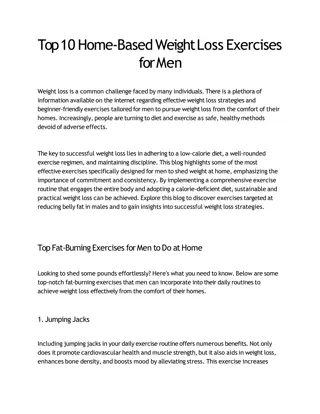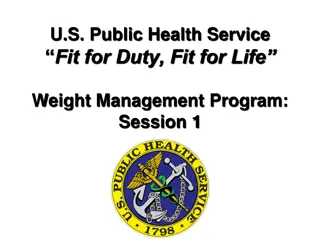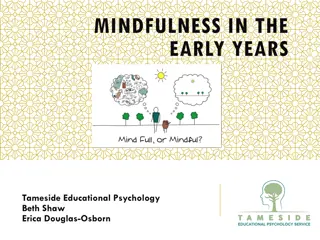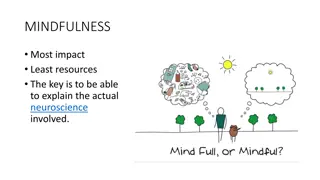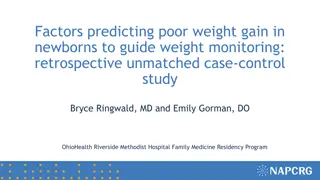Mindfulness and Weight Management Study
This session explores the use of mindfulness in weight management studies, focusing on its impact on emotional suffering, motivation, and self-control regarding food consumption. The aim is to review literature on mindfulness for weight management and evaluate the role of nutritional guidance in achieving weight loss results.
Download Presentation

Please find below an Image/Link to download the presentation.
The content on the website is provided AS IS for your information and personal use only. It may not be sold, licensed, or shared on other websites without obtaining consent from the author.If you encounter any issues during the download, it is possible that the publisher has removed the file from their server.
You are allowed to download the files provided on this website for personal or commercial use, subject to the condition that they are used lawfully. All files are the property of their respective owners.
The content on the website is provided AS IS for your information and personal use only. It may not be sold, licensed, or shared on other websites without obtaining consent from the author.
E N D
Presentation Transcript
Need CE credit for this session? Please don t forget to sign in order to have your attendance tracked
Disclosure No Support I have not received and will not receive any commercial support related to this presentation or the work presented in this presentation.
Mindfulness, Acceptance and Commitment Therapy and Nutrition Vivian Costa Resende Cunha S nia Maria Mello Neves (PUC-GO, Brasil)
Introduction Control phase Disinhibition Cognitive restriction
Introduction Cognitive Restriction Mindfulness Mindfulness Binge eating Emotional eating
Methodology Mindfulness: - Reduce emotional suffering and increase motivation - Seem to lead to healthier decisions by increasing consciousness of hunger and satiety signals - Increase self-control regarding food consumption by using better self-consciousness and self-regulation - May correct some gaps in current treatments for overweight and obese people
Aim Review the literature on studies that use mindfulness for weight management, and evaluate if the presence of nutritional guidance in the protocols is related to weight loss results.
Methodology Databases: Medline, Pubmed Terms: mindfulness, mindful eating, acceptance and commitment therapy and weight, weight loss, weight control January/2017 March/2017 IC: : 1) intervention based on mindfulness 2) evaluates the relationship between the proposed intervention and weight control 3) publication between 2009 - 2017
Results Results N= 870 Using the search term combinations: mindfulness, mindful eating, acceptance and commitment therapy, and weight, weight loss, weight control N= 211 Articles selected just from titles. N= 15 After excluding duplicates and reading summary, applied inclusion criteria for this review
Results Sample studies: Age: 14 75 years old Overweight/obese: n=8 Obese: n=4 Eutrophy/Overweight/Obese: n=3
Results Mindful eating (n=6) Acceptance and Commitment Therapy (n=4) Meditation Technique (n=3) Mindfulness based stress reduction (n=2)
With nutritional guidance Mindful eating A mindful eating intervention: a theory-guided randomized anti- obesity feasibility study with adolescent Latino females (Daly et al., 2016) Aim Evaluate the effects of a mindful eating intervention (MEI) satiety-focused on BMI, weight, and mindful awareness Sample Methodology 37 teenagers Overweight and obese 1/3 (MEI) 2/3 Standard treatment MEI Once a week for six weeks 90 min per session with focus on satiety cues and triggers to overeat. Follow-up: 4 weeks ST Only met once to receive guidance about nutritional and physical activity Results MEI -1.1 kg/m2 (6 weeks) -1.4 kg/m2 (10 weeks) ST +0.72 kg/m2
With nutritional guidance Mindful eating Weight loss with mindful eating in African American women following treatment for breast cancer: a longitudinal study (Chung et al., 2015) Aim Evaluate the association between mindful eating intervention and weight loss in African American women following chemotherapy for breast cancer Sample Methodology Single group intervention 12 weeks weight loss program + mindfulness session, and follow-up (3 months). - Weight loss program dietary counseling by nutritionist every 2 weeks - Mindfulness sessions (120 min) sessions every two weeks in small groups (5 to 8 participants) *Participants weight and MEQ score were assessed on weeks 0, 13, and at the end. 22 women with history of breast cancer single group Results MEQ scores increased while weight and BMI decreased - Weight loss was larger for the group with higher MEQ scores
With nutritional guidance Mindful eating Comparative effectiveness of a mindful eating intervention to a diabetes self-management intervention among adults with type 2 diabetes: a pilot study (Miller et al., 2012) Aim Compared the effect of mindful eating to diabetes self-management education (DSME) smart choice, in adults with type 2 diabetes mellitus Sample Methodology - 27 participants in MB-EAT for diabetes 25 participants in Smart Choice (SC) intervention - Both interventions lasted 3 months eight sessions weekly followed by two weeks with two sessions (2.5 hours per session) and follow-up one month and three months after intervention MB-EAT for diabetes: MB-EAT + information about glycaemia and diet SC: self-management content covering factors that contribute to the onset of DM2. - Results - Weight reduction in both groups but not significant between groups. -
With nutritional guidance Mindful eating The effect of a mindful restaurant eating intervention on weight management in women (Timmerman & Brown, 2012) Aim To evaluate the effect of a Mindful Restaurant Eating intervention on weight management Sample Methodology 35 women eating out at least 3 times a week (22 54.4kg/m2) - Control group: 16 - Intervention group: 19 - Six weeks with weekly meetings (2 hour session) focused on reducing calorie and fat intake when eating out through education, behavior change strategies , and mindful eating meditation. Results - No follow-up - - Intervention group: -1.7kg Control group: -0.2kg
With nutritional guidance Mindful eating Pilot study: mindful eating and living (MEAL): weight, eating behavior, and psychological outcomes associated with a mindfulness-based intervention for people with obesity (Dalen et al., 2010) Aim To test a pilot program called Mindful eating and living (MEAL). Sample Methodology - 10 adults (7 women, 3 men) BMI > 30 kg/m2 MEAL (Mindful eating and living) program for obese/overweight individuals - 6 weeks of weekly session for two hours each - Mindfulness meditation, exercise for group eating and group discussion Results At follow-up (12 weeks): -4 kg - Measurements: baseline, after intervention, follow-up (12 weeks)
Without nutritional guidance Mindful eating A mindful eating group intervention for obese women: a mixed methods feasibility study (Kidd et al., 2013) Aim 1) Describe the effect of 8-week mindful eating intervention on mindful eating, weight, self-efficacy, depression, and biomarkers of weight in urban underserved, obese women. 2) identify themes of the lived experience of mindful eating. Sample Methodology 12 obese women (BMI > 30 kg/m2) Mixed methods design quantitative and qualitative Results - Mindful eating intervention: Weekly 60 to 90 minute sessions of mindful eating for 8 weeks, follow by a focus group (identify themes of the lived experience of mindful eating) No significant change in weight, BMI ,and body composition. Women reported feeling less depressed and happier
Without nutritional guidance ACT An open trial of acceptance-based behavioral intervention for weight loss (Forman et al., 2009) Aim Provide a preliminary evaluation of an innovative behavioral weight control program that incorporates new developments from the field of behavior therapy Sample Methodology 29 women overweight and obese (IMC >25.61 kg/m2 < 48.69 kg/m2 - Conduced at workplace 1 hour per week during 12 weeks 12 sessions Follow-up: 6 months Three central components related with acceptance: distress tolerance, mindfulness ,and commitment enhancement Measurements: before treatment, after 12 weeks and after 6-month follow-up - - Results Average weight loss 6.6% of body weight from baseline to post-test and average weight loss 9.6% after follow-up -
Without nutritional guidance ACT Exploratory randomised controlled trial of a mindfulness based weight loss intervention for women (Tapper et al., 2009) Aim Explore the efficacy of a mindfulness-based weight loss intervention for women Sample Methodology - Data collected at baseline, after four and six months of intervention. - No dietary counseling, with intervention group attending four workshops (2 hours each session). Three workshops were conducted over three consecutive weeks with a fourth follow-up session taking place approximately 3 months later - Components (values; cognitive diffusion; control; acceptance/willingness; self- awareness mindfulness; committed action) - 62 women (BMI > 22.5 < 52.1 kg/m2): 31 intervention and 31 control group Results - Intervention group had significant reduction in BMI (-0.54 kg/m vs. -0.04 control group)
With nutritional guidance ACT A randomized trial of an acceptance-based behavioral intervention for weight loss in people with high internal disinhibition (Lillis et al., 2016) Aim Determine whether Acceptance-Based Behavior Intervention (ABBI) produces better weight losses than SBT among individuals with high internal disinhibition Sample Methodology ABBI:SBT 162 overweight and obese adults (average BMI = 37.6 kg/m2) - - - Weekly sessions for 6 months, Then every two weeks for 3 months And finally monthly for 3 months = 32 sessions Measurements: baseline, month 6, 12, 18, and follow up 24 (1 year) Results - ABBI: -4.1kg/ SBT: -2.4 kg (no statistical difference) Weight gain from the end until follow-up ( 4.6 kg ABBI vs 7.1kg SBT)
With nutritional guidance ACT An acceptance-based behavioral intervention for weight loss: a pilot study (Niemeier et al., 2012) Aim Assess changes in weight and psychological variables over the 6 month treatment program, and 3 month follow-up. Sample Methodology ABBI = SBT + ACT - One hour weekly meetings for six months (24 weeks) - Measurements: at baseline, after 6 months of treatment and follow-up (3 months) - Behavioral components: dietary prescription and physical activity, self- monitoring, stimuli control - Components ACT: working towards values, acceptance techniques (mindfulness) 21 obese and overweight women and men (BMI >30 kg/m2) Results Participants lost an average of 12 kg after six months and 12.1kg after 3 months follow-up
With nutritional guidance Meditative Exploring mindfulness and mindfulness with self-compassion centered interventions to assist weight loss: theoretical considerations and preliminary results of a randomized pilot study (Mantzios & Wilson, 2014 ) Aim Explored whether developing mindfulness and self-compassion through meditation supports weight loss Sample Methodology 63 (22 women and 41 men) 30 control group, 14 mindful self-compassion, 19 mindfulness meditation - Initially all participants were instructed to monitor their weight and food consumption Participants went through 2-day (mindfulness meditation group) or 3-day training (mindful self-compassion group) and they were requested to practice 3 times per day, 20-30 minutes per session, for a period of five weeks Weigh-ins were done on day 1, after 5 weeks, 6 months, and 12 months - Results Mindful self-compassion group lost more weight - not statistically significant but both experimental groups were significantly different from the control group -
Without nutritional guidance Meditative Group vs. Single mindfulness meditation: exploring avoidance, impulsivity, and weight management in two separate mindfulness meditation settings (Mantzios & Giannou, 2014) Aim Address whether practicing mindfulness individually is as effective as in group settings (assist dieters) in aiding weight loss Sample Methodology Initially participants attended one day of practice session on mindfulness meditation. During 6 weeks: 152 (65 women and 87 men) 76 group meditation and 76 individual meditation BMI average = 28.74kg/m2 - Individual group participants received a CD with meditation techniques Group participants attended the meditation session at an open recreational area 3 daily session were set and participants were asked to attend one of those 3 sessions Results - Significant difference in weight loss between group session (-0.83kg) and individual sessions (-0.52kg)
With nutritional guidance Meditative Coping with food cravings. Investigating the potential of a mindfulness-based intervention (Alberts et al., 2010) Aim Examined whether mindfulness-based strategies can effectively reduce food cravings in an overweight and obese population Sample Methodology All participants received the same dietary treatment consisting of weekly 1.5 hours sessions, over 10 weeks, with nutritionist. After nutritional information, participants engaged in physical activities for 1 hour 19 (17 women, 2 men) overweight and obese Results - Group intervention: 7-week manual treatment aiming for advice regulation through acceptance: body scan, mindfulness meditation Statistical difference in weight for both groups. Intervention group decreased desire/craving for food
With nutritional guidance MBSR Mindfulness intervention for stress eating to reduce cortisol and abdominal fat among overweight and obese women: an exploratory randomized controlled study (Daubenmier et al., 2011) Aim Explored the effects of a mindfulness-based intervention for stress eating on abdominal adiposity Sample Methodology - Intervention based on components of: MBSR + MBCT + MB-EAT Nine weekly meetings of 2.5 hours and 7-hour meeting of silence and guided meditation practice, after the sixth session Intervention group: participants were encouraged to practice mindfulness 30 minutes per day, 6 times a week, and use mindful techniques before and during meals 47 obese and overweight women (average BMI: 31.2 kg/m2) 24 intervention group, 23 control group - Results Groups did not differ in average cortisol, weight ,or abdominal fat throughout the study -
Without nutritional guidance MBSR Participation in mindfulness-based stress reduction is not associated with reductions in emotional eating or uncontrolled eating (Kearney et al., 2012) Aim Examine the relationship between MBSR participation and eating habits to assess whether this widely available program influences eating Sample Methodology 48 participants 42 men and 6 women, BMI < 25 (11); 25 29.9 (18) and > 30 (18) - MBSR Intervention participants met once a week (2.5 hours per session) for eight weeks. In addiction to weekly session, participants were asked to engage in meditation practice for 45 minutes daily, six times a week. Data were collected 2 weeks prior to the first MBSR session (baseline), immediately after the end of the MBSR program, and 4 months after the program ended Results - Weight and BMI increased significantly after follow-up
Discussion Daly et al. (2016) Chung et al. (2015) o Miller et al. (2012) Mindful eating Intervention (67%) Timmerman & Brown (2012) Dalen et al. (2010) o Kidd et al. (2013) Lilis et al. (2016) Niemeier et al. (2012) ACT Intervention (100%) Forman et al. (2009) Tapper et al. (2009) Alberts, Mulkens & Smeets (2010) Meditation Techniques Intervention (100%) Mantzios & Wilson (2014) Mantzios & Giannou (2014) o Daubernmier et al. (2011) MBSR Kearney et al. (2012) Intervention
Discussion With nutritional guidance Only nutritional guidelines With food plan Timmerman & Brown (2012) Lilis et al. (2016) Mantzios & Wilson (2014) Niemier et al. (2012) Tapper et al. (2009) o Miller et al. (2012) MB-EAT-D Chung et al. (2015) o Daubernmier et al. (2011) Daly et al. (2016) Dalen et al. (2010) Alberts, Mulkens & Smeets (2010)
Discussion Other measures MINDFUL EATING Daly et al. (2016) Mindful Attention Awareness Scale (MASS) Chung et al. (2015) Mindful Eating Questionnaire (MEQ) Miller et al. (2012) Metabolic, dietary, and physical activity measures Timmerman & Brown (2012) -Dietary intake (24 h dietary recalls), Emotional Eating Scale (EES), Self- efficacy for Eating Behaviors Scale (SEEBS), Barriers to Weight Management in Restaurant Eating (BarriersRE) Dallen et al. (2010) Three Factor Eating Questionnaire (TFEQ) , Binge Eating Scale (BES), Beck Depression Inventory (BDI) , Beck Anxiety Inventory (BAI), Perceived Stress Scale (PSS),Positive and Negative Affect Schedule (PANAS), Kentuchy Inventory of Mindfulness Skills (KIMS), Inflammation markers Kidd et al. (2013) Weight Efficacy Lifestyle Questionnaire (WEL) , Mindful Eating Questionnaire (MEQ), Center of Epidemiologic Studies Depression Scale (CED-S)
Discussion Other measures ACT Lilis et al. (2016) Eating Inventory (measures of eating behavior with three subscales cognitive restraint, disinhibition, hunger) Niemier et al. (2016) Eating Inventory - disinhibition, The Acceptance and Action Questionnaire for Weight-Related Difficulties (AAQW), Distress Tolerance Scale (DTS) Forman et al. (2009) Weight and Lifestyle Inventory (WALI), Eating Inventory (EI) disinhibition, Cognitive Restraint Subscale (CRT), Dutch Eating Behaviors Questionnaire (DEBQ), Food-related acceptance and action questionnaire (FAAQ) , Philadelphia Mindfulness Scale (PHLMS) Tapper et al. (2009) Dutch Eating Behaviour Questionnaire (DEBQ) , Emotional Eating Questionnaire (EEQ), Binge Eating Scale (BES) , Acceptance and Action Questionnaire (AAQ-II), Dietary adherence
Discussion MEDITATION TECHNIQUES Alberts et al. (2010) General Food Craving Questionnaire (GFCQ) Mantzios & Wilson (2014) - Mantzios & Giannou (2014) Mindful Attention and Awareness Scale (MAAS), Barratt Impulsivity Scale (BIS-11), Cognitive-Behavioral Avoidance Scale
Discussion MBSR Daubenmier et al. (2011) Kentucky Inventory of Mindfulness Skills (KIMS), Body Responsiveness Scale, The Wheaton Chronic Stress Inventory, The Perceived Stress Scale, The Dutch Eating Behavior Questionnaire (DEBQ) Kearney et al. (2012) Three Factor Eating Questionnaire (TFEQ), The Food Frequency Questionnaire (FFQ), The Five Facet Mindfulness Questionnaire (FFMQ), The Patient Health Questionnaire -9 (PHQ-9), Posttraumatic stress disorder (PTSD)
Discussion Reviews Reviews Aim O Reilly et al. (2014) To determine the effectiveness of MBIs for treating obesity related eating behaviors, such as binge eating, emotional eating, and external eating Godfrey et al. (2014) To summarize the literature on mindfulness-based interventions and determine their impact on binge eating behavior. Katterman et al. (2014) To examine interventions where mindfulness meditation was the primary intervention and its effect on subclinical disordered eating or weight. Mantzios e Wilson (2015) 1) to explore what mindfulness is in the context of psychological research 2) to review the main empirical findings for weight loss in mindfulness-based intervention programmed. 3) to explore the contradictions in the finding 4) the benefits of adding self- compassion training to mindfulness practice to assist weight loss. Olso and Emery (2015) To evaluate the effects of mindfulness-based interventions on weight among individuals attempting weight loss. Rogers et al. (2016) To evaluate the impact of mindfulness-based interventions on psychological and physical health outcomes in adults who are overweight or obese. This review was the first to evaluate the presence and type of nutritional intervention in weight loss
Conclusion Weight loss was documented among participants in mindfulness interventions for 11 of the 15 studies identified for review 9 out of 11 studies with nutritional guidance had success on weight loss (81.8%), while 2 out of 4 without nutritional guidance had success on weight loss (50%) All studies with food plan nutritional guidance provided effect for weight loss All studies using those using meditation techniques (Rogers et al. , 2016) an ACT approach provided important effect for improving BMI as well as Overall studies reported improvements in the targeted eating behaviors (Katterman et al., 2014; O Reilly et al., 2014) Results suggest that mindfulness meditation effectively decreases binge eating and emotional eating in populations engaging in this behavior (Katterman et al., 2014) The results should not be generalized, due to the diversity of protocols and populations (Godfrey et al., 2014; Katterman et al.,2014; Olso and Emery, 2015) .
Conclusion Nutrition guidance seems to be a important variable in the mindfulness protocols for weight loss. Studies should try to identify the types of nutritional guidance that can improve the effectiveness of mindfulness interventions to assist weight loss.
Thanks! soniamelloneves@gmail.com
References Alberts HJEM, Mulkens S, Smeets M, Thewissen R (2010). Coping with food cravings. Investigating the potential of a mindfulness- based intervention. Appetite, 55; 160-163. Chung SY, Zhu S, Friedmann E, Kelleher C, Koziovsky A, Macfarlane KW, Tkaczuk ZHR, Ryan AS, Griffith KA (2015). Weight loss with mindful eating in African American women following treatment for breast cancer: a longitudinal study. Support Care Cancer. Dalen J, Smith BW, Shelley BM, Sloan AL, Leahigh L, Begay D (2010). Pilot study: a mindful eating and living (MEAL): weight, eating behavior and psychological outcomes associated with a mindfulness-based intervention for people with obesity. Complementary Therapies in Medicine, 18; 260-264. Daly P, Pace T, Berg J, Menon U, Szalacha LA (2016). A mindful eating intervention: a theory-guided randomized anti-obesity feasibility study with adolescent Latino females. Compleemntary Therapies in Medicine, 28; 1-7. Daubenmier J, Kristeller J, Hecht FM, Maninger N, Kuwata M, Jhaveri K, Lusting RH, Kemeny M, Karan L, Epel E (2011). Mindfulness Intervention for stress eating to reduce cortisol and abdominal fat among overweight and obese women: an exploratory randomized controlled study. Journal of obesity. 13p. Foman EM, Butryn ML, Hoffman KL, Herbert JD. Na open trial of an acceptance-based behavioral intervention for weight loss. Cognitive and behavioral practice, 16; 223-235. Kearney DJ, Milton ML, Malte CA, McDermott KA, Martinez M, Simpson TL. (2012). Participation in mindfulness-based stress reduction is not associated with reductions in emotional eating or uncontrolled eating. Nutrition research, 32; 413-420.
References Kidd LI, Graor CH, Murrock CJ. A Mindful eating group intervention for obese women: a mixed methods feasibility study (2013). Archives of Psychiatric Nursing, 27; 211-218. Lillis J, Niemeir HM, Thomas JG, Unick J, Ross KM, Leahey TM, Kendra KE, Dorfman L, Wing RR (2016). A randomized trial of an acceptance-based behavioral intervention for weight loss in people with high internal disinhibition. Obesity, 24; 2509-2514. Mantzios M, Giannou K (2014). Group vs. Single mindfulness meditation: exploring avoidance, impulsivity and weight management in two separate mindfulness meditation settings. Applied Psychology: health and well-being, 6(2); 173-191 Mantzios M, Wilson JC (2014). Exploring mindfulness and mindfulness with self-compassion centered interventions to assist weight loss: theoretical considerations and preliminary results of a randomized pilot study. Mindfulness. Miller CK, Kristeller JL, Headings A, Nagaraja H, Miser F (2012). Comparative effectiveness of a mindful eating intervention to a diabetes self-management intervention among adults with type 2 diabetes: a pilot study. Journal of the academy of nutrition and dietetics, 112; 1835-1842. Niemier HM, Leahey T, Reed KP, Brown RA, Wing RR (2012). Na acceptance-based behavioral intervention for weight loss: a pilot study. Behavior Therapy, 43; 427-435. Tapper K, Shaw C, Ilsley J, Hill AJ, Bond FW, Moore L (2009). Exploratory randomised controlled trial of a mindfulness-based weight loss intervention for women. Appetite, 52; 396-404. Timmerman GM, Brown A (2012). The effect of a mindful restaurant eating intervention on weight management in women. J Nutr Educ Behav, 44(1); 22-28
Need CE credit for this session? Please don t forget to sign out order to have your attendance tracked


